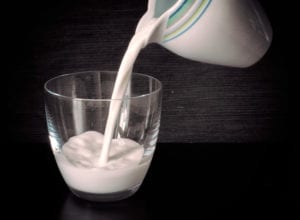Milk for Mesothelioma? Proteins in Cow’s Milk May Kill Mesothelioma Cells

There is new evidence that substances in cow’s milk may trigger a physiological process that leads to the death of chemotherapy-resistant mesothelioma cells.
The substances are known as BAMLET and BLAGLET and they consist of either alpha- or beta-lactalbumin from cow’s milk and a lipid called oleic acid. The two protein-lipid complexes have been shown to have cytotoxic effects on eight other types of cancer.
Now, researchers in Sydney, Australia have found that the same may be true for malignant mesothelioma, one of the hardest cancers to treat.
BAMLET and BLAGLET Explained
β-Lactoglobulin is the primary whey protein in the milk of cow’s and sheep (though not humans). α-Lactalbumin is the protein that regulates the production of lactose in the milk of almost all mammals.
In 2006, microbiologists in Sweden published a paper on the cancer-killing power of alpha-lactalbumin in human milk (HAMLET), including the ability of this protein to seek out and trigger cell death in cancer cells while sparing healthy cells.
A Danish study published in 2010 in Molecular Cancer Therapeutics determined that a similar complex derived from cow’s milk had the same effect. “It kills a wide range of transformed cells of various origins while leaving nontransformed healthy cells largely unaffected, both in vitro and in vivo,” wrote the researchers.
They determined that the complex kills tumor cells via “lysosomal membrane permeabilization”, a process that plays a key role in the natural cell death of mesothelioma cells.
Protein-Lipid Complexes May Support Mesothelioma Treatment
For the new Australian study, researchers performed tests on 16 different mesothelioma cell lines in the lab. They discovered that, the higher the oleic acid content of the complex, the more lethal it was to malignant mesothelioma cells, which are typically highly resistant to standard chemotherapy treatments.
“BAMLET showed…cytotoxicity to cisplatin-resistant, pemetrexed-resistant, vinorelbine-resistant, and parental rat mesothelioma cells, indicating the BAMLET anti-cancer mechanism may be different to drugs currently used to treat mesothelioma,” writes lead study author Emma Rath, PhD, a molecular biologist with the University of Sydney.
Should Mesothelioma Patients Drink More Milk?
Unfortunately, fighting mesothelioma is not as simple as consuming milk that contains these cytotoxic proteins. A key part of effectiveness of these complexes is the oleic acid, which was applied, along with the proteins, directly to cancer cells and did not travel through the digestive system.
The good news for mesothelioma patients, however, is that these two compounds could represent a new and potentially safer way to combat the asbestos cancer. This could be especially important for patients who have not had good luck with other mesothelioma treatments.
“The results reported here indicate that BAMLET and BLAGLET may be effective second-line treatment options for mesothelioma,” concludes the report in the online medical journal PLoS One.
Sources:
Rath, EM, et al, “BAMLET kills chemotherapy-resistant mesothelioma cells, holding oleic acid in an activated cytotoxic state”, August 29, 2018, PLoS One, eCollection
Rammer, P, et al, “BAMLET activates a lysosomal cell death program in cancer cells”, January 2010, Molecular Cancer Therapeutics, pp. 24-32
Ho, JCS, “HAMLET – A protein-lipid complex with broad tumoricidal activity”, January 2017, Biochemical and Biophysical Research Communications, pp. 454-458





